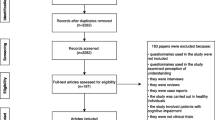Abstract
The prevalence of genetic disease is high in the Middle East, particularly in the United Arab Emirates. Our study assesses the information provided in, and the readability ease of, informed consent forms (ICF) for genetic research studies. A multicenter retrospective cross-sectional review of 54 ICFs was conducted to assess compliance by comparing them with standard good clinical practice guidelines for developing consent forms. Readability of the forms was determined using the Flesch-Kincaid scale. Overall Good Clinical Practice compliance for the ICFs averaged at 63 %. Information regarding privacy, confidentiality, specimen collection and storage were absent from the majority of the ICFs. Readability ease score was low (36.7 ± 4.6) and required college-level (11.8 ± 1.4) reading skills to understand the information. Our study highlights the need to improve the readability and information contained in the ICFs for genetic research studies in our setting. Our findings may be generalized to similar cultures in the Middle East and Asia.

Similar content being viewed by others
References
Alahmad, G., Al-Jumah, M., & Dierickx, K. (2012). Review of national research ethics regulations and guidelines in Middle Eastern Arab countries. BMC Medical Ethics, 12, 13–34.
Al-Gazali, L., & Ali, B. R. (2010). Mutations of a country: a mutation review of single gene disorders in the United Arab Emirates (UAE). Human Mutation, 31, 505–20.
Al-Jasmi, F. A., Tawfig, N., Berniah, A., et al. (2013). Prevalence and novel mutations of lysosomal storage disorders in United Arab Emirates LSD in UAE. Journal of Microbiology and Infectious Disease Reports, 10, 1–9.
Barakat-Haddad, C. (2013). Prevalence of high blood pressure, heart disease, thalassemia, sickle-cell anemia, and iron-deficiency anemia among the UAE adolescent population. Journal Environmental and Public Health, 2013, 680631. doi:10.1155/2013/680631. epub.
Bayoumi, R. A., & Yardumian, A. (2006). Genetic diseases in the Arab world. British Medical Journal, 333, 819–20.
Beecher, H. K. (1966). Ethics and clinical research. New England Journal of Medicine, 16(274), 1354–60.
de Vries, J., Bull, S. J., Doumbo, O., Ibrahim, M., Mercereau-Puijalon, O., Kwiatkowski, D., & Parker, M. (2011). Ethical issues in human genomics research in developing countries. BMC Medical Ethics, 18, 12–15.
Dixon, J. R., Jr. (1998). The international conference on harmonization good clinical practice guideline. Quality Assurance, 6, 65–74.
Emanuel, E. J., Wendler, D., Killen, J., & Grady, C. (2004). What makes clinical research in developing countries ethical? The benchmarks of ethical research. Journal Infectious Diseases, 189, 930–7.
Falagas, M. E., Korbila, I. P., Giannopoulou, K. P., Kondilis, B. K., & Peppas, G. (2009). Informed consent: how much and what do patients understand? American Journal of Surgery, 198, 420–35.
Grady, C. (2010). Do IRBs protect human research participants? Journal of American Medical Association, 304, 1122–3.
HAAD: Health Authority Abu Dhabi. www.haad.ae. Accessed on Jan 2, 2014.
Hamand, J. (1996). Working for change in the Arab world. Advocacy for reproductive health: Arab world. Planned Parenthood Challenges, 1, 5–7.
Heeney, C., Hawkins, N., de Vries, J., Boddington, P., & Kaye, J. (2011). Assessing the privacy risks of data sharing in genomics. Public Health Genomics, 14, 17–25.
Ibrahim, K., Eada, E.A., Younis, N. (2006). Ministry of Health: Drug Control-UAE Guidance for conducting clinical trials based on drugs/medical products and Good Clinical Practice.6;1–44.
ICH (1996). International conference on harmonization of technical requirements for registration of pharmaceuticals for human use. ICH harmonized tripartite guideline for Good Clinical Practice E6(R1) items (a-t); 14–16.
Joffe, S., Cook, E. F., Cleary, P. D., Clark, J. W., & Weeks, J. C. (2001). Quality of informed consent: a new measure of understanding among research subjects. Journal of the National Cancer Institute, 17, 139–47.
Lahey, T. (2013). The ethics of clinical research in low-and middle income countries. Handbook of Clinical Neurology, 118, 301–313.
Macklin, R. (1999). Understanding informed consent. Acta Onccologica, 38, 83–7.
McGuire, A. L., & Beskow, L. M. (2010). Informed consent in genomics and genetic research. Annual Review of Genomics and Human Genetics, 11, 361–81.
Nair, S.C., Ibrahim, H. (2014). GCP Compliance and Readability of Informed Consent Forms from an Emerging Hub for Clinical Trials (manuscript number PICR_45_14)Perspectives in Clinical Research (in press).
Nair, S. C., Ibrahim, H., & Celentano, D. D. (2013). Clinical trials in the Middle East and North Africa (MENA) region: grandstanding or grandeur? Contemporary Clinical Trials, 36, 704–10.
National Institutes of Health-Good Clinical Practice Resource Guide (2011). Research on human specimens: Are you conducting human subject’s research?IV-1-I3.
Nyika, A. (2009). Ethical and practical challenges surrounding genetic and genomic research in developing countries. Acta Tropica, 112-1, S21–31.
Paasche-Orlow, M. K., Taylor, H. A., & Brancati, F. L. (2003). Readability standards for informed-consent forms as compared with actual readability. New England Journal of Medicine, 348, 721–6.
Resnik, D. B., Patrone, D., & Peddada, S. (2010). Evaluating the quality of information about alternatives to research participation in oncology consent forms. Contemporary Clinical Trials, 31, 18–21.
Tadmouri, G. O., Nair, P., Obeid, T., Al Ali, M. T., Al Khaja, N., & Hamamy, H. A. (2009). Consanguinity and reproductive health among Arabs. Reproductive Health, 6, 17–21.
Terblanche, M., & Burgess, L. (2010). Examining the readability of patient-informed consents. Journal of Clinical Trials, 2, 157–162.
Viera, A. J., & Garrett, J. M. (2005). Understanding inter-observer agreement: the kappa statistic. Family Medicine, 37, 360–3.
Wolf, M. S., Williams, M. V., Parker, R. M., Parikh, N. S., Nowlan, A. W., & Baker, D. W. (2007). Patients’ shame and attitudes toward discussing the results of literacy screening. Journal ofHealth Communication, 12, 721–32.
Conflicts of Interest
The authors SCN and HI declare no conflicts of interest.
Ethical Approval
This article does not contain any studies with human participants or animals performed by any of the authors.
Author information
Authors and Affiliations
Corresponding author
Rights and permissions
About this article
Cite this article
Nair, S.C., Ibrahim, H. Informed Consent Form Challenges for Genetic Research in a Developing Arab Country with High Risk for Genetic Disease. J Genet Counsel 24, 294–299 (2015). https://doi.org/10.1007/s10897-014-9763-y
Received:
Accepted:
Published:
Issue Date:
DOI: https://doi.org/10.1007/s10897-014-9763-y



